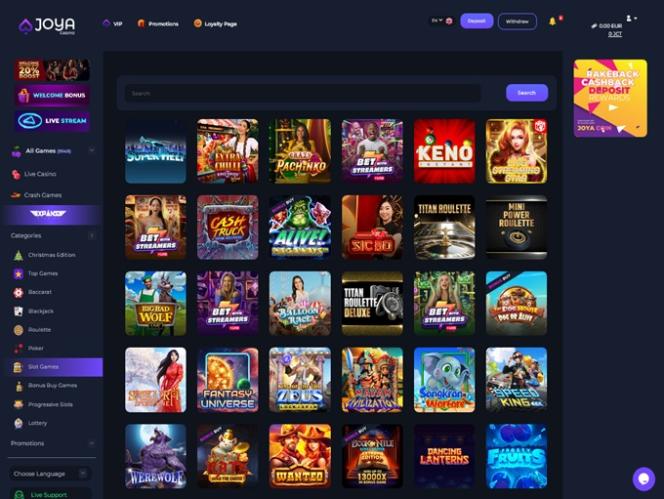
How Licensing Affects Slots in Online Casinos
In the ever-evolving landscape of online gambling, one significant factor that shapes the experience of players is the licensing of online casinos. The way in which slots are offered, regulated, and managed is directly influenced by the jurisdictional laws and requirements that govern these licenses. This article delves into How Licensing Affects Slots in Bangladesh joya 9 casino Bangladesh the importance of licensing and how it affects the variety, quality, and safety of slot games available to players.
The Importance of Licensing in Online Gambling
Licensing serves as a critical element for online casinos, ensuring that they operate under strict regulations designed to protect players. Each jurisdiction has its own body that issues licenses, and they have varying standards concerning fairness, security, and overall operation of online gaming platforms.
From the Isle of Man to Malta and Gibraltar, the reputation of these licensing authorities plays a role in determining the trust levels of players. When a casino is licensed by a recognized authority, customers can be assured that the games are fair, payouts are reliable, and their personal data is secure.
Types of Licenses and Their Implications
There are multiple types of licenses that an online casino can acquire, each coming with its own set of rules and requirements. Here are some key examples:

- PGCB License: Offered by the Pennsylvania Gaming Control Board, this license is crucial for operators wishing to serve players in Pennsylvania, ensuring that all games are tested for fairness.
- MGA License: The Malta Gaming Authority is considered one of the most reputable and structured licensing bodies worldwide, and its license indicates high standards of operation and player protection.
- UK Gambling License: Obtained from the UK Gambling Commission, this license is recognized for its rigorous enforcement of regulations, including responsible gambling measures.
- Curaçao License: While more accessible, this license is acceptable for operators seeking less regulation, which can sometimes lead to concerns about the fairness of games.
The Effect of Licensing on Slot Game Variety
The type of license held by an online casino can significantly influence the range of slot games available. For instance, casinos licensed in jurisdictions with stringent regulations are often obligated to partner only with reputable game developers. This partnership ensures that the slots offered are of high quality, innovative, and regularly updated.
On the other hand, casinos with less respected licenses may carry a wider variety of games but often from lesser-known developers. This scenario can lead to a higher risk of encountering games that are less fair or lack the same production quality found in titles from renowned providers.
Regulations That Shape Slot Game Design
Another aspect where licensing has a profound impact is in the actual design and mechanics of slot games. Licensing bodies often dictate specific regulations regarding return to player (RTP) percentages, house edge, and bonus features. For example:
- RTP percentages are the amount of money wagered on a slot that is returned to players over time. Many licensing authorities require a minimum RTP percentage (usually around 85%) to ensure players have a fair chance.
- The inclusion of responsible gambling tools such as loss limits, time-out features, and self-exclusion options can also be influenced by the licensing authority’s regulations, impacting how slots operate within that environment.
Player Safety and Security Considerations

Licensing is indispensable when it comes to ensuring player safety. A reputable license requires online casinos to utilize advanced security measures like SSL encryption to protect players‘ personal and financial information. Moreover, independent auditing of games helps ensure that slot outcomes are random and fair, thus safeguarding the players’ betting experience.
For instance, players at casinos licensed in the UK are protected by comprehensive regulations that include checks on how casinos operate and maintain funds, ensuring that player deposits are kept separate from operating funds.
Emerging Trends and the Future of Licensing
As technology advances and the online gambling industry grows, the landscape of licensing is also changing. New trends, such as the rise of cryptocurrency casinos and innovative gaming experiences powered by augmented reality (AR) and virtual reality (VR), challenge traditional licensing frameworks.
Regulatory bodies will need to adapt to these changes by developing new guidelines to encompass these technologies. For example, as online casinos begin to offer more interactive and immersive experiences, discussions around licensing for betting on such platforms will become increasingly important.
Conclusion: The Impact of Licensing on Player Experience
In conclusion, the licensing of online casinos plays a crucial role in determining the quality, variety, and safety of slot games. Players should prioritize licensed online casinos to ensure a fair and enjoyable gaming experience. As the industry continues to develop, understanding the implications of licensing will be vital for both players and operators looking to thrive in this competitive market.
In the complex world of online gambling, knowledge and awareness can provide players not only with the best gaming experiences but also with the security and peace of mind they deserve.

